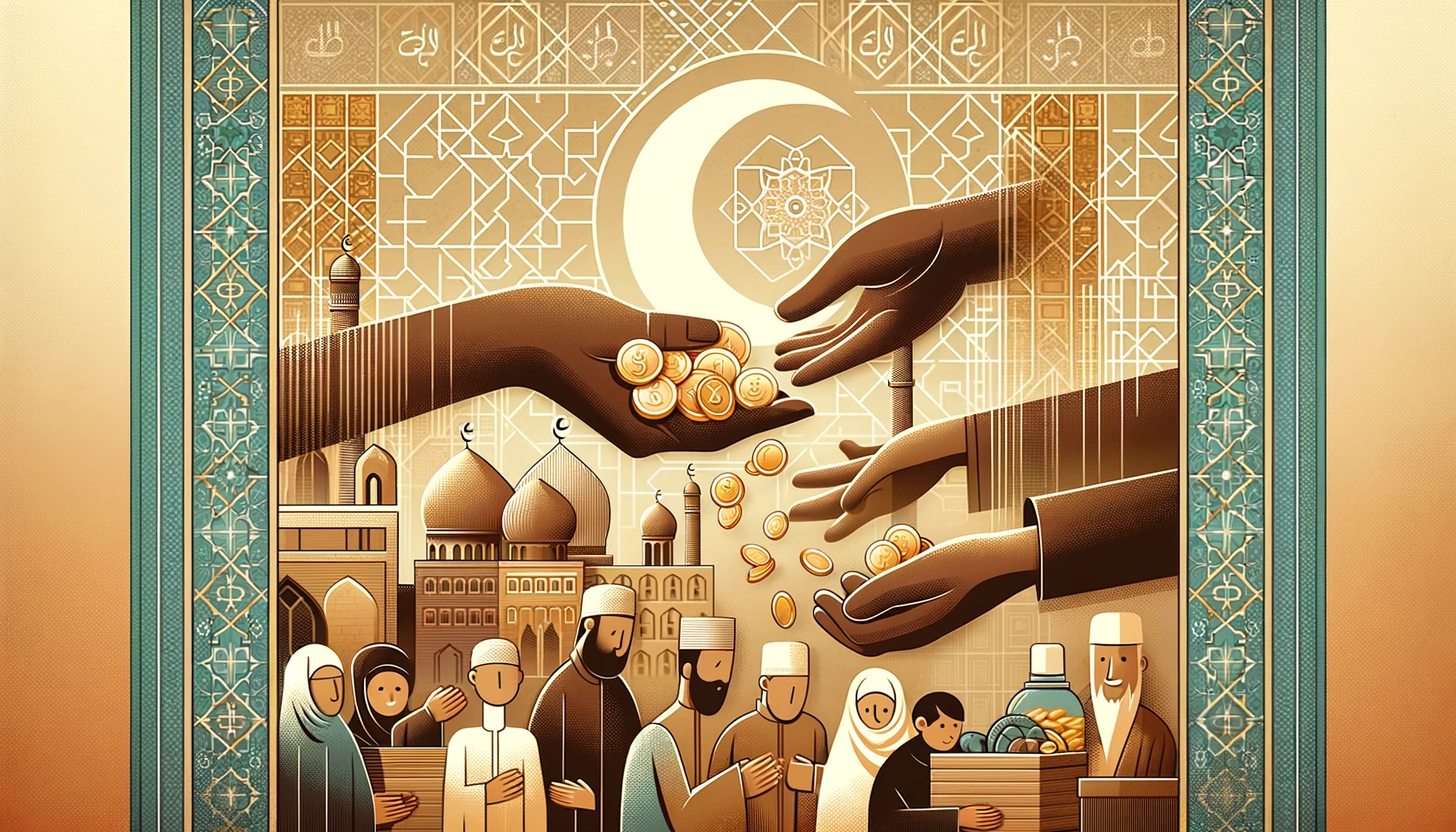Table of Contents
ToggleZakat is a fundamental aspect of Islam, emphasizing the importance of charity and wealth distribution among Muslims. It serves as a tool to balance social inequality, requiring those who are financially able to contribute to the less fortunate. This comprehensive guide delves into the essentials of Zakat, covering its calculation, the Nisab threshold, timing, and specific considerations regarding gold, silver, and other assets.
What is Zakat?
Zakat is a cherished practice in Islam, standing as one of its Five Pillars. It’s more than just a charitable donation—it’s a compulsory act of giving that each eligible Muslim is expected to fulfill.
The idea behind Zakat is beautiful in its simplicity: by donating a specific portion of their wealth, Muslims help those in need, fostering a deep sense of community and mutual care. Beyond the act of giving, Zakat is also seen as a way to cleanse one’s wealth, promoting a spirit of generosity and a shared responsibility for the well-being of the community. This practice underscores the importance of compassion and empathy, reminding us all of our duty to support one another.
What’s Included in My Zakat Calculations?
Calculating Zakat involves a thoughtful process where a Muslim assesses their entire wealth to figure out how much they need to give. This isn’t just about what’s in their wallet or bank account. It includes cash on hand, savings in banks, any investments they have, as well as physical assets like gold and silver.
Even the goods they have for business purposes come into play. It’s essential to carefully evaluate the total value of all these assets. This comprehensive assessment ensures that the amount of Zakat calculated is accurate and reflective of their true capacity to give. It’s a practice that embodies fairness and thoroughness, ensuring that the support reaches those in need in a way that is both meaningful and impactful.
Cash and Savings
When calculating Zakat, it’s important to remember that all forms of money you have are part of the equation. This includes the cash you have in hand, any money saved in bank accounts, and any form of currency you might be holding onto. Including these in your total asset calculation is crucial for determining the correct amount of Zakat.
It ensures that the contribution you make is reflective of your actual financial capacity, adhering to the spirit of generosity and community support that Zakat represents. This meticulous approach ensures that your giving is both meaningful and in line with the principles of fairness and responsibility.
Investments and Shares
Investments and shares in companies are indeed considered when calculating Zakat, but there’s a key criterion: they must be held with the intention of generating profit. It’s not just about owning these assets; their purpose plays a significant role in determining their Zakatability. When it comes to including these in your Zakat calculation, the current market value is what counts.
This means you need to assess how much your investments and shares are worth in the market at the time of calculating Zakat. This approach ensures that the calculation reflects the true potential of your assets to contribute to your ability to support those in need. It’s a thoughtful way to ensure that your Zakat payment is as accurate and fair as possible, embodying the principles of responsibility and generosity at the heart of this practice.
Gold and Silver
Gold and silver hold a particular status in the calculation of Zakat, being subject to it regardless of their form—whether as jewelry, coins, or bullion. A critical aspect to consider in this context is the Nisab threshold, which specifically applies to these precious metals. The Nisab represents the minimum amount of wealth an individual must own before they are obligated to pay Zakat.
This threshold ensures that Zakat contributions are made by those with sufficient means, maintaining fairness and equity within the community. When assessing gold and silver assets for Zakat purposes, one must evaluate their current market value to determine if it meets or exceeds the Nisab threshold, thereby obligating the wealth holder to a Zakat payment. This process underscores the principle of responsibility towards the less fortunate, ensuring that assistance is extended from those of means to those in need.
Business Assets
Merchandise and goods that are held for business purposes also play a crucial part in the calculation of Zakat. It’s essential to assess these items at their current market value, not at the cost price or the price they were acquired for. This means that when you’re figuring out how much Zakat you need to pay, you should consider what your business inventory would sell for in the market today.
This approach ensures that the Zakat calculated accurately reflects the true potential of your business assets to contribute to your overall wealth. Including these assets in the Zakat calculation embraces the spirit of comprehensive generosity, ensuring that your contribution effectively supports those in need based on the full scope of your economic activities and resources.
What is Nisab?
The Nisab represents a thoughtful threshold in Islamic finance, setting the minimum amount of wealth a Muslim needs to have before they are required to pay Zakat. This principle ensures that Zakat, as an act of faith and solidarity, is mandated only for those who possess a certain level of financial stability. The measure of Nisab is beautifully practical, pegged to the value of precious metals—specifically, 85 grams of gold or 595 grams of silver.
By using these tangible standards, the Nisab not only adjusts with economic conditions over time but also maintains fairness by reflecting the varying capacities of individuals to contribute. This threshold underscores the compassionate and equitable spirit of Zakat, ensuring that the obligation to support the less fortunate is balanced with the giver’s financial ability.
When Do You Pay Zakat?
Zakat is an annual commitment that aligns with the Islamic lunar calendar, underscoring its deep roots in Islamic tradition. The specific due date for each individual’s Zakat payment is tied to a personal milestone: the date when their wealth first surpassed the Nisab threshold. This approach personalizes the Zakat obligation, making it a reflective and conscientious practice.
It’s up to each individual to keep track of this significant date, ensuring they fulfill their duty to pay Zakat at the correct time each year. This responsibility highlights the importance of self-awareness and diligence in maintaining one’s commitments to community and faith. Paying Zakat in this timely and disciplined manner not only upholds a pillar of Islam but also reinforces the bonds of mutual support and care within the Muslim community.
How Much Zakat Do I Pay?
The standard rate for Zakat is set at 2.5%, a specific portion that is applied to one’s total Zakatable wealth annually. This rate comes into effect once an individual’s assets have surpassed the Nisab threshold and remained above this minimum level for a full lunar year. The calculation of Zakat at this rate is a testament to the balance and fairness inherent in Islamic financial principles, ensuring that the obligation to contribute to the welfare of the less fortunate is proportionate to one’s financial capacity. By setting a clear, modest percentage, the practice of Zakat fosters a sense of unity and shared responsibility among the Muslim community, encouraging a culture of generosity and support for those in need.
Key Facts for Zakat Paid on Gold or Silver
- Gold and Silver Nisab: The Nisab for gold is 85 grams, and for silver, it is 595 grams.
- Valuation: Use the current market value of gold and silver to calculate Zakat.
- Mixed Jewelry: If jewelry contains both gold and silver, calculate each metal separately according to its Nisab.
Other Zakat Facts You Need to Know
- Loans and Debts: Deduct personal debts from your total assets before calculating Zakat.
- Intention: The intention to pay Zakat must be made at the time of payment.
- Distribution: Zakat should be given directly to those eligible to receive it, such as the poor, needy, and debt-ridden.
Conclusion
Zakat stands as a fundamental aspect of Islamic faith, deeply rooted in the principles of wealth redistribution and fostering social cohesion. It’s designed not merely as a religious obligation but as a transformative tool to bridge the gap between the wealthy and the less fortunate, ensuring that everyone in the Muslim community is cared for.
By understanding the principles of Zakat, accurately calculating it, and fulfilling this duty, Muslims not only adhere to Islamic law but also actively contribute to the well-being and stability of their community. This act of giving is a powerful expression of faith, solidarity, and compassion, reinforcing the bonds that unite the community and promoting a sense of collective responsibility towards the common good.
FAQs
1. Can Zakat be paid in installments?
Yes, Zakat can be paid in installments throughout the year, but it should be fully paid by the due date.
2. Is Zakat applicable to rental income?
Yes, rental income is subject to Zakat. However, the property itself is not, unless it is held for sale in a business.
3. Can Zakat be given to family members?
Zakat cannot be given to one’s immediate family (parents, spouse, children), but it can be given to needy relatives such as cousins, uncles, and aunts.
4. Are there exceptions to who must pay Zakat?
Yes, individuals who do not meet the Nisab threshold or are not financially stable are not required to pay Zakat.
By adhering to these guidelines, Muslims fulfill a key pillar of their faith, contributing to the welfare of the ummah (community) and purifying their wealth.















